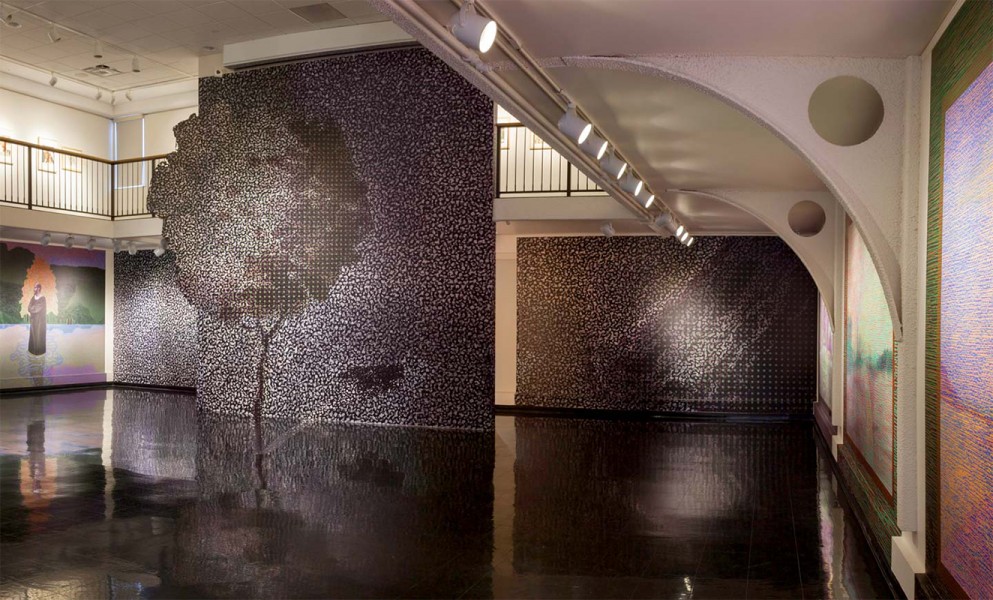Art Museum to present Glaser exhibits
Galleries to feature works of legendary graphic designer/illustrator.

The Binghamton University Art Museum’s spring exhibitions will highlight one of the world’s greatest graphic designers and illustrators.
“Milton Glaser: Modulated Patterns” opens Friday, March 31, in the Main Gallery and will feature sketches, prints and printed designs. A complementary exhibition of watercolors, “The Piero Project,” will be on display at the museum’s Susan M. Reifer ’65 and Stanley J. Reifer ’64 Mezzanine Gallery. The exhibitions run through May 20.
“Milton is one of those artists/illustrators/graphic designers who are omnipresent,” said curator Blazo Kovacevic, an assistant professor of art and art design. “He is like a Renaissance man. There is no start and no end to what he does.”
Glaser, the first graphic designer to receive the National Medal of the Arts, is best known for designing the I Love New York logo and the iconic poster of Bob Dylan featured on the singer’s 1967 “Greatest Hits” album. Glaser also founded Push Pin Studios, New York magazine, and redesigned the packaging, signage and store patterns at Grand Union supermarkets.
The “Modulated Patterns” exhibition will not focus on Glaser’s “greatest hits.” Instead, it will showcase Glaser’s work with patterns and perception in a series of landscapes and images that honor artists such as Paul Cézanne, Henri de Toulouse-Lautrec and Gustav Klimt. “The Piero Project,” meanwhile, features 37 artistic interpretations of the paintings of Italian Renaissance artist Piero della Francesca.
The idea for the exhibitions came two years ago, when a friend and collaborator of Glaser – graphic designer/illustrator Mirko Ilic – had his own exhibition at the Art Museum. Ilic suggested a Glaser show, leading Kovacevic and Art Museum Director Diane Butler to visit Glaser’s New York City studio to gauge his interest.
“He was very warm and welcoming,” said Kovacevic, who had also curated Ilic’s show. “We started talking and he suggested that he would like to see his prints (displayed) on a larger scale. He was interested in seeing his prints in a different light.”
For Kovacevic, the visit was similar to meeting artist/sculptor Dennis Oppenheim.
“I thought they would be so full of their own greatness,” Kovacevic said. “Never. Milton was so modest. He was more into listening, processing and telling something wonderfully appropriate. He was accommodating and supportive in every step.”
Glaser even had Kovacevic, photographer Marc Newton and Tom McDonough, associate professor of art, return to his studio for an interview and a portrait. Glaser’s talk with McDonough is featured in a catalog that can be purchased at the exhibitions.
“It offers glimpses into how Milton Glaser works, what he thinks and what he can offer as such a pivotal figure in graphic design,” Kovacevic said of the interview. “Milton loved the catalog and said he will use copies for his archive. That’s meaningful for all of us in this project.”
As curator, Kovacevic said he wanted to do more than hang Glaser’s works in the gallery: He was interested in displaying what Glaser believes represents him best as he nears his 90th birthday.
“I wanted to push the effect of the large scale to the limit,” Kovacevic said. “We constructed one of his prints in order to get an immersive installation using anamorphic illusion. … It’s a bold, experimental way of dealing with his intention.”
The exhibitions will also include cases in the museum’s entryway that feature Glaser’s sketches that he used to produce and inspire the prints inside the gallery.
“It’s an educational dimension,” Kovacevic said. “That’s important as one of the (museum’s) goals. We are going to show that Milton Glaser is not only an artist and designer, but someone who is deeply involved in education.”
A talk by Steven Brower at 5 p.m. April 27 at the museum will also provide further insight into Glaser’s work. Brower teaches graphic design/illustration at Marywood University in Scranton, Pa., and was an associate at The Push Pin Group.
“Milton Glaser is someone I believe that every university, every school and every museum should cherish and have students learn about,” Kovacevic said.
